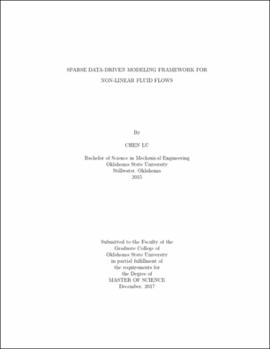| dc.contributor.advisor | Jayaraman, Balaji | |
| dc.contributor.author | Lu, Chen | |
| dc.date.accessioned | 2021-04-06T16:33:13Z | |
| dc.date.available | 2021-04-06T16:33:13Z | |
| dc.date.issued | 2017-12 | |
| dc.identifier.uri | https://hdl.handle.net/11244/329106 | |
| dc.description.abstract | Although fluid flows have been successfully modeled using the Navier-stokes equations, there exists only a limited class of flows for which exact analytical or numerical solutions are feasible at this time. For many practical flow situations, exact models are hard to find which makes the collection of data from experiments valuable. Consequently, there is a great demand for data-driven approaches that can predict the evolution and shed light on the flow physics when (a) the underlying knowledge of the dynamical system is non-existent and (b) the measurement data is sparse, but streams in over time. Such data-driven models are especially useful for control of dynamically evolving systems and online decision making for achieving improvement in performance and efficiency of many engineering problems such as drag reduction, mixing enhancement for combustion, and unmanned system navigation. The broad scheme of data-driven modeling comprises of three major components: development of reduced-order model from full data, reconstruction from sparse data to full data to analyze fine-scale flow features, and the ability to update the models online when the system is dynamically evolving in time. Although the above components have been studied in detail, integrating them into a practically usable tool has rarely been addressed. Hence, the overall goal of this research project is to develop an integrated dynamic data-driven modeling framework that leverages sparse streaming data with application to non-linear fluid flow systems. In this dissertation, the three major components of the data-driven modeling framework are developed, the various techniques explored and finally specific algorithmic advances for improved performance of prediction and reconstruction are reported as enumerated below. Firstly, a sparse generalized convolution framework is developed which is capable of predicting non-linear fluid flows such as flow past a cylinder and Boussinesq flow accurately and efficiently. Secondly, sparse reconstruction techniques based on $L_2$ and $L_1$ minimization, and statistical interpolation methods are investigated to recover incomplete data for flow past a cylinder and turbulent channel flow. The feasibility of incremental singular value decomposition is also examined so that the sparse convolution framework may be updated dynamically to improve non-equilibrium flow predictions. | |
| dc.format | application/pdf | |
| dc.language | en_US | |
| dc.rights | Copyright is held by the author who has granted the Oklahoma State University Library the non-exclusive right to share this material in its institutional repository. Contact Digital Library Services at lib-dls@okstate.edu or 405-744-9161 for the permission policy on the use, reproduction or distribution of this material. | |
| dc.title | Sparse data-driven modeling framework for non-linear fluid flows | |
| dc.contributor.committeeMember | Elbing, Brian R. | |
| dc.contributor.committeeMember | Jacob, Jamey D. | |
| osu.filename | Lu_okstate_0664M_15546.pdf | |
| osu.accesstype | Open Access | |
| dc.type.genre | Thesis | |
| dc.type.material | Text | |
| dc.subject.keywords | data-driven | |
| dc.subject.keywords | fluid flow | |
| dc.subject.keywords | modeling | |
| dc.subject.keywords | nonlinear | |
| dc.subject.keywords | reconstruction | |
| dc.subject.keywords | sparse | |
| thesis.degree.discipline | Mechanical and Aerospace Engineering | |
| thesis.degree.grantor | Oklahoma State University | |
